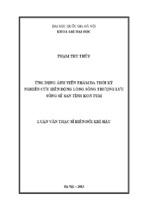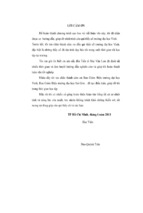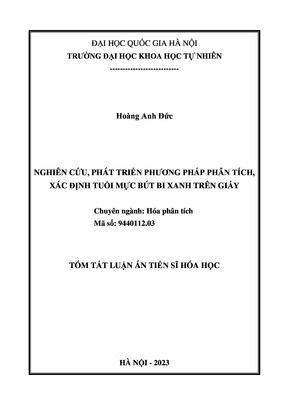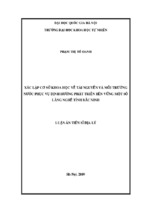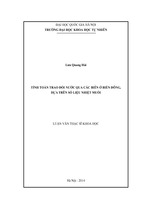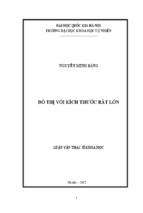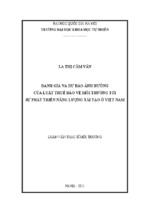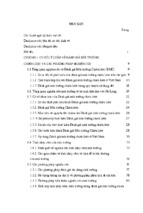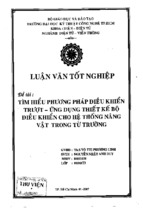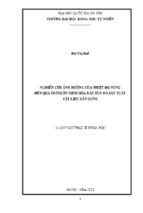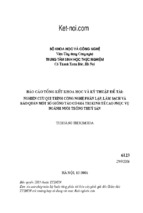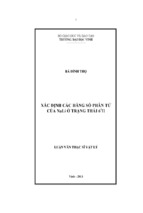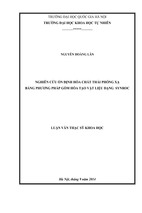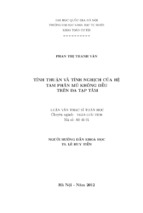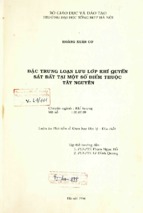MINISTRY OF EDUCATION AND TRAINING
BA RIA - VUNG TAU UNIVERSITY
---------------
MASTER’S THESIS OF TESOL
SECOND YEAR STUDENTS’ SPEAKING COMPETENCE IN ENGLISH FOR
SPECIFIC PURPOSES AT LAM DONG MEDICAL COLLEGE.
PHẠM MINH HIỀN
Student’s code: 18110088
Supervisor: TRƯƠNG THỊ MỸ VÂN, Ph.D.
BA RIA-VUNG TAU, 2021
MINISTRY OF EDUCATION AND TRAINING
BA RIA VUNG TAU UNIVERSITY
---------------
MASTER’S THESIS OF TESOL
SECOND YEAR STUDENTS’ SPEAKING COMPETENCE IN ENGLISH FOR
SPECIFIC PURPOSES AT LAM DONG MEDICAL COLLEGE.
Pham Minh Hien
Student’s code: 18110088
Supervisor: Trương Thi My Van, Ph.D.
BA RIA-VUNG TAU, 2021
DECLARATION
The thesis titled “Second year students’ speaking competence in English for specific
purposes at Lam Dong Medical College.” was conducted under the supervision of
Ph.D. Truong Thi My Van, senior lecturer of the Faculty of Foreign Languages, Dalat
University.
I hereby declare that the information reported in this study is the result of my own
work, except where due reference is made. The thesis has not been accepted for any
degree and is not concurrently submitted to any candidature for any other degree or
diploma.
Candidate’s name: Pham Minh Hien
Ba Ria – Vung Tau, 2021
i
RETENTION AND USE OF THE THESIS
My name is Pham Minh Hien, being a M.A candidate of Tesol at Ba Ria – Vung Tau
University. I accept the requirements of the University relating to the retention and
use of my study deposited in the Library.
I agree that the original of my thesis deposited in the Library should be accessible for
purposes of study and research, in accordance with the normal conditions established
by the Librarian for the care, loan or reproduction of theses.
Candidate’s name: Pham Minh Hien
Ba Ria – Vung Tau, 2021
ii
ACKNOWLEDGEMENTS
First of all, I wish to express my gratitude to the following people without whom I
could never have accomplished this thesis.
I am deeply grateful to my supervisor, PhD. Truong Thi My Van, for giving me
guidance throughout the process of conducting my thesis and giving me valuable
comments, greatly inspiring me in the learning process as well as in completing the
thesis.
I acknowledge my gratitude to the lecturers of Ba Ria - Vung Tau University (BVU)
for their dedication to teaching me during my study time.
I would like to express my sincere thanks to my participants including my students,
my colleagues and all members of the training department of Lam Dong Medical
College, without whose unconditional participation, this research could not have been
completed.
I am grateful to my workplace, the leaders, the board of directors, all members of
Department of Medicine – Basic Science, Lam Dong Medical College for the support
of time and other favorable conditions for me to complete my thesis.
Sincerely thank you!
iii
ABSTRACT
Speaking is one of the most important skills that needs to be focused on and enhanced
because it is an effective means of communication. It is an important aspect to acquire
when learning a second or foreign language, and the success of learning the language
is measured from the performance of learners to speak the language learned because
students who can speak English well will have the self-confidence to face and even
interact with English native speakers. However, this skill is also considered one of
the most difficult aspects of the language learning process. Many students find it
difficult to fully express their thoughts in English; they are afraid of communicating
in English even though they have learnt this language continuously for many years.
Some students understand English texts but they cannot speak English fluently. I am
working in the medical field in tertiary level, and I would like to focus on the
challenges faced by nursing students in Lam Dong Medical College (LMC) in
learning speaking English for specific purposes (ESP) classes and the factors
affecting students’ speaking competence in my research. The purposes of the study
are to investigate the challenges and the factors affecting medical students’ learning
speaking ESP. The research method used in this study is qualitative. Data collection
instruments are surveys, interviews and class observation. One hundred students of
the Nursing department in Lam Dong Medical College were involved in answering a
questionnaire, three interviews conducted with three nursing students and three other
interviews for three groups of nursing students selected purposively in order to
support the research aims. The findings of the study revealed that there were several
major problems and many factors affecting students’ speaking competence that
hindered students' development of ESP English speaking ability and led to their low
quality output in the context of LMC.
Key words: Speaking skills, communicative skills, English for specific purposes,
Medical English
iv
TABLE OF CONTENTS
DECLARATION ........................................................................................................ i
RETENTION AND USE OF THE THESIS ...........................................................ii
ACKNOWLEDGEMENTS .................................................................................... iii
ABSTRACT .............................................................................................................. iv
TABLE OF CONTENTS .......................................................................................... v
LIST OF TABLES ................................................................................................... ix
LIST OF FIGURES ................................................................................................. xi
LIST OF ABBREVIATIONS.................................................................................xii
CHAPTER 1 INTRODUCTION ............................................................................ 1
1.1 Background of the study ................................................................................... 1
1.2 Statement of the Problem .................................................................................. 2
1.3 Research Objectives of the Study ..................................................................... 3
1.4 Research Questions ........................................................................................... 4
1.5 Scope of the research ........................................................................................ 4
1.6 Significance of the research .............................................................................. 4
1.7. Organization of the Thesis This thesis includes 5 chapters as follows: ........... 5
CHAPTER 2 LITERATURE REVIEW ................................................................ 7
2.1 Communicative competence ............................................................................. 7
2.1.1 Definition ................................................................................................... 7
2.1.2 Characteristics of speaking competence .................................................... 9
2.1.2.1 Fluency .................................................................................................. 9
2.1.2.2 Accuracy ............................................................................................. 10
2.1.2.3 Pronunciation ...................................................................................... 10
2.1.2.4 Vocabulary .......................................................................................... 11
2.1.3 The methods of teaching English speaking skills .................................... 11
2.1.4 Factors affecting English speaking learning ............................................ 15
2.1.5 The challenges of Speaking Deficiency among EFL Students ................ 17
v
2.1.5.1 Linguistics problems ........................................................................... 17
2.1.5.2 Motivation for learning ....................................................................... 19
2.1.5.3 Psychological problems ...................................................................... 20
2.1.5.4 The problems relating to topical knowledge....................................... 22
2.1.5.5 The environment of speaking.............................................................. 22
2.1.5.6 Fluency ................................................................................................ 22
2.1.5.7 Mother tongue use............................................................................... 23
2.1.5.8 Low or uneven participation ............................................................... 23
2.2 English for Specific Purposes (ESP) ............................................................... 24
2.2.1 Definition of English for Specific Purposes (ESP) and types of ESP ..... 24
2.2.2 Characteristics of English for Specific Purposes ..................................... 28
2.2.3 English for Medical Purposes (EMP) ...................................................... 29
2.2.4 The Problems in Teaching ESP amongst EFL Students .......................... 30
2.2.4.1 Difficulties Related to Students .......................................................... 31
2.2.4.2 Difficulties Related to Teachers.......................................................... 33
2.2.4.3 Difficulties Related to environment and others .................................. 34
2.3 Theoretical framework .................................................................................... 35
2.4 Previous studies ............................................................................................... 36
2.4.1 Review of studies related to the speaking problems faced by EFL learners
........................................................................................................................... 36
2.4.2 Review of studies related to the problems faced by EFL learners in
learning ESP in general and in learning English of Medical Purposes............. 38
2.5 Chapter summary ............................................................................................ 41
CHAPTER 3 METHODOLOGY ......................................................................... 42
3.1 Research questions .......................................................................................... 42
3.2 Research design ............................................................................................... 42
3.3 Research site .................................................................................................... 43
3.4 Research participants ...................................................................................... 44
3.4.1 The students ............................................................................................. 44
3.4.2 The teachers ............................................................................................. 45
vi
3.5 Research instruments ...................................................................................... 45
3.5.1 Questionnaire ........................................................................................... 46
3.5.2 The semi-structured interview ................................................................. 47
3.5.3 Class observation ..................................................................................... 49
3.6 Data analysis methods ..................................................................................... 50
3.7 Chapter Summary............................................................................................ 51
CHAPTER IV FINDINGS AND DISCUSSION ................................................. 52
4.1. Research question 1: What are the challenges faced by the second-year
students at Lam Dong Medical College in English speaking classes? ................. 52
4.1.1 The description of ESP teaching and learning at Lam Dong Medical
College. ............................................................................................................. 52
4.1.2 The challenges in teaching and learning ESP English speaking skill in
Lam Dong Medical College .............................................................................. 54
4.1.2.1 The quality of admissions on the training process .............................. 54
4.1.2.2 Motivation on studying speaking skills in ESP classrooms ............... 54
4.1.2.3 Psychological issues............................................................................ 54
4.1.2.4 The abuse of the mother tongue in ESP speaking .............................. 55
4.1.2.5 Students’ speaking abilities................................................................. 56
4.1.2.6 Other problems students faced when learning ESP speaking skills ... 58
4.2. Research Question 2: What are the factors affecting the students’ English
speaking competence? ........................................................................................... 62
4.2.1 Mass entry admission ............................................................................... 62
4.2.2 Perceptions of teaching and learning Medical English ............................ 63
4.2.3 Unreasonable distribution of training programs ...................................... 64
4.2.4 Little time being spent on studying speaking medical English................ 65
4.2.5 Time to self - study medical English of students ..................................... 66
4.2.6 Teaching and testing methods of lecturers ............................................... 68
4.2.7 Textbooks and materials .......................................................................... 70
4.2.8 Facilities for teaching and learning specialized English .......................... 73
4.3 Chapter summary ............................................................................................ 73
vii
CHAPTER V CONCLUSION .............................................................................. 74
5.1 Conclusions ..................................................................................................... 74
5.2 Implications ..................................................................................................... 75
5.2.1 Recommend for administrators ................................................................ 75
5.2.2 Recommend for teachers .......................................................................... 75
5.2.3 Recommend for students .......................................................................... 75
5.3 Limitation of the research ............................................................................... 77
5.4 Suggestions for further research...................................................................... 77
REFERENCES ........................................................................................................ 79
APPENDICES ......................................................................................................... 89
APPENDIX A: QUESTIONAIRES ..................................................................... 89
APPENDIX B: SEMI – STRUCTURED INTERVIEW ...................................... 99
APPENDIX C: CLASS OBSERVATION .........................................................101
viii
LIST OF TABLES
Table 2.1: Components of Communicative Competence ........................................... 8
Table 2.2: Some common methods of teaching English speaking ........................... 12
Table 2.3: The factors that influence the learning of English ................................... 15
Table 2.4: The Problems of Speaking Deficiency amongst EFL Students ............... 24
Table 2.5: The characteristics of ESP ....................................................................... 28
Table 2.6: The main speaking problems during the process of teaching and learning
English speaking skills ...................................................................................... 37
Table 2.7: The problems faced by EFL learners in learning English of Medical
Purposes ............................................................................................................ 39
Table 2.8: The problems and the recommendations of solutions in the Teaching of
English in medicine ........................................................................................... 40
Table 4.1: The challenges faced by LMC students in learning speaking Medical
English............................................................................................................... 61
Table 5.1: Some solutions to improve the quality of teaching and learning speaking
skill in the Medical English Course of LMC .................................................... 76
ix
LIST OF GRAPHS
Graph 4.1: The students’ Perception on their issues in ESP Classes ........................ 56
Graph 4.2: Students' communicative ability in ESP classroom ................................ 57
Graph 4.3: Students' levels of speaking skills of Medical English in the nursing
department. ........................................................................................................ 60
Graph 4.4: Comparison of student results of learning speaking Medical English in 3
consecutive academic years .............................................................................. 61
Graph 4.5: Survey result of staff and lecturers on the importance of studying ........ 63
Medical English ........................................................................................................ 63
Graph 4.6: Student survey results of importance of studying Medical English ....... 64
Graph 4.7: Survey results of lecturers, staff and students on appropriate level of
duration of Medical English training ................................................................ 65
Graph 4.8: Students' time to learn to speak specialized English ............................... 66
Graph 4.9: Time to study Medical English of students............................................. 67
Graph 4.10: Evaluation of teaching methods of speaking skills in ESP classroom . 69
Graph 4.11: Resources for specialized English learning .......................................... 71
Graph 4.12: Survey on facilities for studying specialized English ........................... 73
x
LIST OF FIGURES
Fig. 2.1. The Tree of ELT (Adapted from Hutchinson and Waters (1987, p. 17)). .. 27
Fig.2.2. The conceptual framework .......................................................................... 36
xi
LIST OF ABBREVIATIONS
CLT
Communicative Language Teaching
EFL
English as a Foreign Language
EMP
English for Medical Purposes
ESL
English as a Second Language
ESP
English for Specific Purposes
GE
General English
LMC
Lam Dong Medical College
TPLT
Task Based Language Teaching
TPR
Total Physical Responses
xii
CHAPTER 1
INTRODUCTION
1.1 Background of the study
Language is a very essential instrument that enables speakers to state their existence
and others ask something, express agreement and refusal. For this reason, oral
language or speaking is regarded as of utmost importance to language learners.
Achieving fluency in oral communication is the main dream and the main motivation
which a large number of learners bring to language classes (Richards &Renandya,
2002). Bailey and Savage (1994) states that speaking in a second or foreign language
has often been viewed as the most demanding of the four skills. Most people learn a
language to have a goal of being able to speak so that they can communicate well in
that language. Thus, the demand for speaking fluently is higher than that of other
language skills.
English is considered as a global language and thus both the West and the East have
become equally busy promoting this language (Imam, 2005). English has become the
international language used in business, technological and academic communication.
This trend of English globalization, as a worldwide phenomenon, makes it necessary
to communicate with people from different linguistic and cultural backgrounds.
Nowadays, the majority of English users can be found in countries where the
language is employed as a foreign or second language. Effective use of English as a
second language (ESL) or foreign language (EFL) in oral communication is one of
the most common but also highly complex activities people need to learn for their
interpersonal communication. English speaking skill requires speakers to use the
authentic language where it means that students need to use the language in any
occasions or when communicating with the other students in an academic context.
When students speak, they construct ideas in words, express their perceptions, their
1
feelings, and their intentions, so that the interlocutors grasp the meaning of what they
mean.
It is not surprising that to Vietnamese students, the English language is very essential
to the development of their country in general and their city in particular. They are
aware of the crucial role of this international language which plays an increasingly
important role in the development of science, technology, politics, economics, culture
and international relations. Good speaking skills in English will be very helpful for
students in daily communication and in finding good jobs at big companies and multinational corporations that have been invested in Vietnam. English speaking skills are
considered as a tool to work effectively. Therefore, the demand for teaching and
learning English, especially English for specific purposes is rising, not only for
communication purposes.
English for specific purposes (ESP) has been developed worldwide since the 1960s
and it is receiving a lot of attention, especially in universities. In different countries,
the specialized English also develops at different levels. In Vietnam, teaching of ESP
has been applied for a long time and has become an important subject in the training
program at universities, colleges and professional secondary schools to meet the
needs of improving the learners' expertise. However, according to Vietnam
Department of Higher Education, teaching and learning English for specific purposes
in Vietnam are still ineffective and has not met the society’s needs. Along with that
trend of development, ESP has also been taught and studied at Lam Dong Medical
College (LMC) in order to equip students with professional knowledge in English,
meeting the professional needs, as well as the needs of communication, information
exchange, study, research or working with foreigners.
1.2 Statement of the Problem
Regarding medical students in general, and students in LMC in particular, they are
aware of the essential role of English in their future jobs. In the future, students in
Lam Dong Medical College can work as pharmacists or nurses in a popular city of
2
tourism – Da Lat, so it is necessary for them to use English to help foreign tourists
who are their patients or customers. They need English to communicate with
foreigners to find out their health problems and then help them to take care of their
health. Furthermore, English language is one of their most valuable resources in the
labor market. Practically, the better medical students in LMC can use English,
specially ESP, the more opportunities they will have to apply for a good job with a
high salary in Vietnam or abroad. However, many students in LMC don’t like English
because they are not good at this language. They learn English because it is one of
the modules in the training program. They feel afraid of learning English, they feel
shy when their lecturers ask them to practice speaking English, they do not want to
actively participate in English classes and do not want to give the contribution to the
classes. The students in Lam Dong Medical College seem to face many challenges in
learning English in general and in learning speaking skills in ESP in particular.
Therefore, this study makes an effort to find out the challenges and the factors
affecting in learning English speaking in ESP classrooms of the medical students in
this context.
1.3 Research Objectives of the Study
Speaking is not only one of the most important skills that need to be focused on and
enhanced because it is an effective means of communication but also is one of the
most difficult aspects of the language learning process. One researcher states,
“Although speaking is considered a main language skill that students should improve,
it has been widely noticed that they face many difficulties in speaking English”
(Samira, 2014, p.22). Enhancing the quality of teaching and learning speaking
English, specially English for specific purposes, for non-English major students at
universities and colleges throughout the country is an issue that draws great attention
from educators. There have been many English language researchers, lecturers,
articles, research papers and books about the challenges of learning a foreign
language, as well as in learning speaking skills to language learners. This study does
3
the same, but aims at non-English major students in the medical field in Vietnam. It
is designed to investigate the possible challenges of teaching and learning speaking
skills in ESP medical classrooms at a college in Lam Dong province, Viet Nam and
the factors affecting students’ speaking skills.
1.4 Research Questions
This study is designed to have insights about the possible challenges in learning
speaking skills in ESP classroom of Lam Dong Medical College students. It is
planned to address the following questions:
1. What are the challenges faced by the second-year students at Lam Dong
Medical College in English speaking classes?
2. What are the factors affecting the students’ English speaking competence?
1.5 Scope of the research
This study focuses only on one skill in learning ESP, speaking skills, and two aspects
which include the challenges and the factors affecting in learning speaking skills of
medical students. Besides, the research only concentrates on the speaking skills of the
second-year nursing students of Lam Dong Medical College, the study does not cover
all students of the college.
1.6 Significance of the research
This study is hoped to shed light into the challenges that medical students in a
Vietnamese context may encounter in learning speaking skills in ESP classrooms and
the factors affecting the students’ English speaking competence. The identification of
the challenges and the underlying factors can be helpful for the teachers and students,
as well as for the college authority to look for solutions or adjustments to improve the
quality of teaching and learning of this subject. This can be also a reference source
for those teachers who are interested in teaching ESP at other medical institutions.
4
1.7. Organization of the Thesis
This thesis includes 5 chapters as follows:
Chapter 1: Introduction
Chapter 1 gives an initial overview of the thesis, which set the general context of the
research. Seven sections are concluded in this, namely “Background to the study”,
“Statement of the problem”, “Research objectives of the study”, “Research
questions”, “Scope of the study”, “Significance of the study”, and “Organization of
the thesis”.
Chapter 2: Literature Review
Chapter 2 presents the theoretical background of some previous studies and it is
composed of 2 main sections: Communicative competence and English for Specific
Purposes (ESP)
Chapter 3: Methodology
Chapter 3 describes research methodology employed in this study, which consists of
research questions, research design, research site, research participants, research
instruments
and
data
analysis
procedures.
This
chapter
accesses
the designed methods of collecting, analyzing, and illustrating the data to
answer the research questions.
Chapter 4: Findings and Discussion
Chapter 4 reveals the findings and discussions of the study according to the research
questions. This chapter presents results of the collected data from questionnaire,
semi-structured interview and class observation and then analysis and discussions are
taken place. The findings are presented and then discussions of the findings are
provided.
Chapter 5: Conclusions
The last chapter is composed of a summary of research findings, as well as an
explanation about unavoidable limitations of the thesis and suggestions for further
5
field-related studies. Ultimately, suggestions for further studies are put forward. It
also recommends some theoretical and pedagogical implications and concludes the
study.
6
- Xem thêm -


